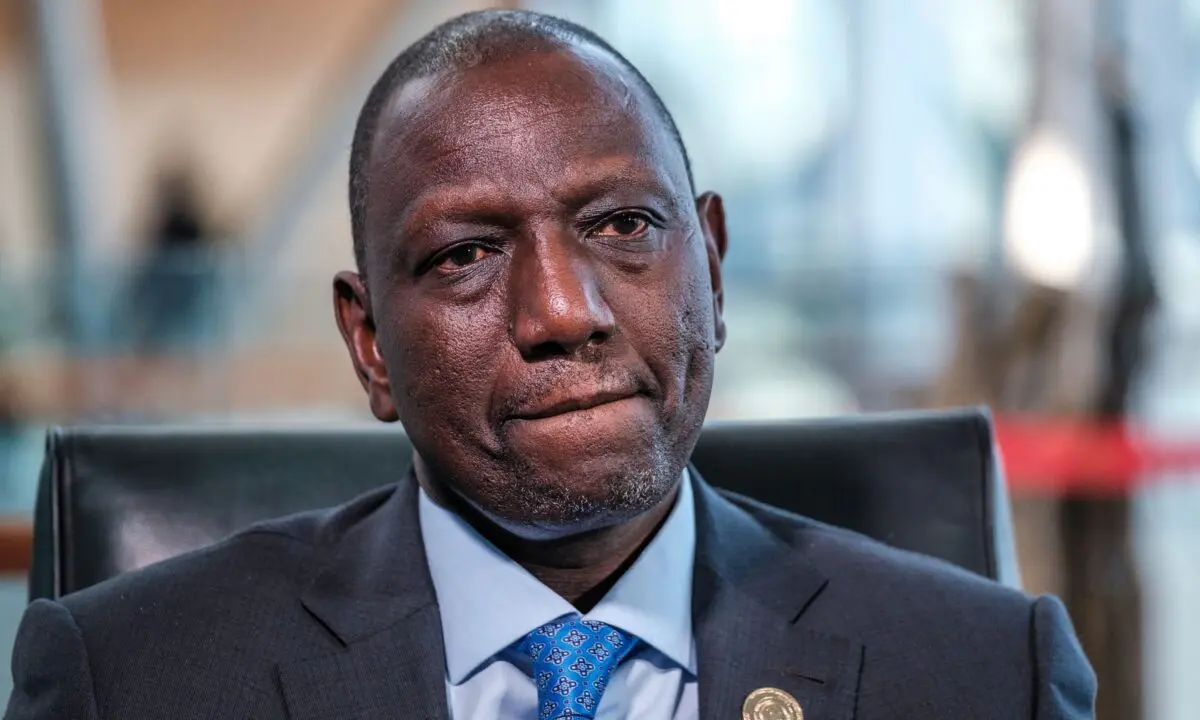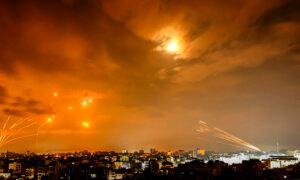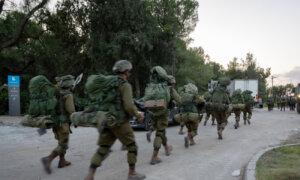I became your enemy because I tell you the truth
“You can fool some of the people all the time and all the people some of the time,
but you can’t fool all the people all the time.” A. Lincoln
JOHANNESBURG—The reactions of different African countries to the escalating violence in Israel and Gaza depend on their histories, their current economic realities, and their alliances with global powers, according to professor Anthoni van Nieuwkerk, international relations expert at the University of South Africa.
“The statements coming from Africa in the aftermath of this horrific attack by Hamas and Israel’s counteroffensive are almost a mirror image of the patterns we saw immediately after Russia invaded Ukraine,” he told The Epoch Times.
“Countries led by parties that are traditionally anti-West are blaming Israel and the West for the situation—much like they blamed Ukraine and the West for [Russian President Vladimir] Putin’s illegal invasion.
“That’s not surprising. What is surprising, at least to me, is that some African administrations are not condemning the brutality, the sheer inhumanity, demonstrated by Hamas.
“It’s almost as if they think that if they do this, then they’re betraying the Palestinian liberation cause.
“Hamas does not represent the Palestinian freedom cause. The stated cause of Hamas is to destroy Israel and kill Jews.”

“I haven’t heard any leader publicly say something along the lines of, ‘We support Palestinian self-determination, but we condemn the horror visited upon innocent Israelis by Hamas; we condemn the slaughter of women, children, and babies.
“‘We condemn the rape of Israeli women on the streets of Gaza. In the same way that we condemn Israel’s killing of innocent Palestinians in Gaza by means of indiscriminate air strikes.'”
Ghana, Kenya, and Rwanda are three of a handful of countries in Africa that have issued unequivocal support for Israel.
Kenyan President William Ruto, who has positioned himself as a key Western ally and whose country has suffered immensely in the past from terrorist attacks, called on the international community to punish the “perpetrators, organizers, financiers, sponsors, supporters, and enablers” of Hamas’s “criminal terrorism.”
Helmoed Heitman, a military historian and former counterinsurgency adviser to the South African Defense Force, said of all sub-Saharan African nations, Kenya has the most reasons to “despise” terrorism and to support a global war on terror.
He recalled the al-Qaeda bombing of the U.S. embassy in Nairobi, Kenya, in 1998, which killed 212 people, mostly Kenyans.
“Since then, Kenya and the United States have had a very strong bond, and Kenya continues to pay a heavy price for its good relations with Washington and especially because it has joined with American forces across East Africa and the Horn of Africa to fight al-Shabaab,” Mr. Heitman said.
Al-Shabaab, a Sunni Islamist militant organization affiliated with al-Qaeda with roots in Somalia, has committed acts of terror in Kenya regularly since the Kenyan military began operations against it in Somalia in 2011.
In 2013, al-Shabaab fighters stormed the Westgate Mall in Nairobi, killing 67 shoppers. In 2015, they killed 148 Kenyan students and staff members in an attack on Garissa University in northern Kenya. A 2019 al-Shabaab bombing in Nairobi killed 21 people. In 2020, al-Shabaab fighters attacked a Kenyan airfield and shot dead three U.S. citizens.
Mr. Heitman said Kenya’s “animosity to all things resembling terrorism” and support for Israel actually dated back to 1976.
On July 4, 1976, Palestinian extremists hijacked an Air France flight between Tel Aviv and Paris and forced the pilots to divert to Entebbe International Airport in Kampala, Uganda. Uganda’s then-ruler, Idi Amin, had been aware of the operation, and his troops supported the terrorists.
After a two-day standoff, Israeli special ops forces—supported by Kenyan soldiers—raided the airport, eventually killing 45 Ugandan soldiers and all the hijackers and rescuing 102 hostages.
Three hostages and one Israeli commando lost their lives. The sole Israeli military fatality was Yonatan Netanyahu, older brother of Israeli Prime Minister Benjamin Netanyahu.
Mr. Amin exacted an immediate and terrible revenge on Kenya for backing the Israeli forces. He ordered his troops to kill all Kenyans residing in Uganda, and 245 were murdered; more than 3,000 fled the country.
Ms. Naidu said Kenya’s current support for Israel’s actions in Gaza and vociferous condemnation of Hamas “should also be seen through the lens of the Ruto administration very much considering Kenya’s economic progress linked in large part to the United States.”
One of the Biden administration’s conditions for the deal to be finalized is that Kenya supports Israel’s political and commercial interests.
Governments in North Africa, where Islam is by far the dominant religion and citizens are fierce supporters of Palestinian independence, have condemned the attacks on Israeli civilians but have suggested that Tel Aviv bears ultimate responsibility because of its “oppression” of Palestinians.
Guided by the United States, Morocco, in particular, has forged cordial relations with Israel in recent years. King Mohammed VI has called for an emergency meeting of the Arab League Council to discuss the war between Israel and Hamas.
Morocco’s Ministry of Foreign Affairs was the first in North Africa to condemn the Hamas brutality. But at the same time, it stated that it had “constantly warned against the repercussions of the political deadlock on peace in the region and against the risks of aggravating the resulting tensions.”
“Dialogue and negotiations remain the only way to achieve a comprehensive and lasting solution to the Palestinian question, on the basis of the resolutions of international legality and the principle of two states, as agreed at international level,” a ministry statement reads.
In contrast, a statement from Algeria’s Ministry of Foreign Affairs was vehemently anti-Israel, stating that it had noted “with deep concern the escalation of barbaric Zionist aggression against the Gaza Strip, which has cost the lives of dozens of innocent children of the Palestinian people, who have fallen as martyrs to the stubbornness of the Zionist occupation in its policy of oppression and persecution imposed on the valiant Palestinian people.”
Algiers called on the United Nations and other international bodies “to protect the Palestinian people from the brutality and criminality that have become the hallmark of the Zionist occupation of the Palestinian territories.”
“Putting an end to the horrors and tragedies resulting from this conflict will undoubtedly require respect for the legitimate national rights of the Palestinian people and the establishment of their independent state on the 1967 borders with Al-Quds [Jerusalem] as its capital,” Algerian President Abdelmadjid Tebboune’s administration stated.
The Tunisian government stated that it supported the people of Palestine “unconditionally.” It recognized their right to defend themselves and to “reclaim land of which they had been robbed.”
Djibouti, which is also a member of the Arab League, stated that Israel was “responsible for the escalation underway, as a result of its continued aggression and constant violations of the rights of the Palestinian people and their holy places.”
Egypt, which has often mediated between Israeli and Palestinian authorities in the past, was more tempered in its response. It called on Hamas and Israel to show “utmost restraint” and warned against the “serious danger” of a regional conflagration.
But it was the reaction of South Africa that was arguably the most significant, according to Mr. van Nieuwkerk, since it had positioned itself as the most likely African candidate for a permanent seat on the U.N. Security Council.
Frank Lekaba, African politics and international affairs lecturer at Wits University in Johannesburg, said South Africa’s “anti-Israel stance” was largely informed by the governing African National Congress’s [ANC’s] struggle against apartheid.
“The ANC. has called on the U.N. to declare Israel an apartheid state, because of the way it treats Palestinians. It says Israel discriminates against Palestinians based on their [Arab] ethnicity, and it calls the Gaza Strip the world’s largest prison,” Mr. Lekaba told The Epoch Times.
“It sees the Palestinian struggle for self-determination and for land in the same light as its past struggles. More significantly, it considers Hamas to be a movement of freedom fighters, not as a terrorist organization.”
The South African government has refused to condemn the Hamas assault on Israel.
Its Department of International Relations (DIR) insisted that the “conflict” was a result of Israel’s “continued illegal occupation of Palestine land, continued settlement expansion, desecration of the Al-Aqsa Mosque and Christian holy sites, and ongoing oppression of the Palestinian people.”
In it, he urged the international community to speed up processes to establish a “viable” Palestinian state.
“Our thoughts are with all the victims’ families and loved ones during this perilous period of fighting. We remain gravely concerned at the devastating escalation in the Israeli–Palestinian conflict and the atrocities committed against civilian populations,” Mr. Ramaphosa wrote.
“We call for the immediate cessation of violence and the exercise of restraint. It is vital that all those who require urgent humanitarian assistance are provided with the basic life-supporting necessities and that human suffering is ameliorated.”
His administration was convinced that it was in a “good position” to play a role in mediating the conflict.
Zane Dangor, director-general of South Africa’s DIR, told The Epoch Times that his government was available to be part of any process aimed at securing an immediate ceasefire between Israeli forces and Hamas.
“We’ve been engaging with the Palestinian Authority, not with anyone else at this stage, but we’re open to engaging with any of the players so that we can assist in whatever way we can towards a just and lasting peace and the negotiations that need to precede that,” he said.
“But our position is that this kind of peace is only possible if Israel withdraws its forces from Palestinian territory and stops allowing Jewish settlements on the West Bank.”
Elizabeth Sidiropolous, director of the South African Institute of International Affairs, told The Epoch Times that Pretoria’s offer was “interesting but perhaps premature.”
“The South African government’s good relations with Hamas are no secret,” she said. “Together with other parties, it could use those to play a positive role. But this crisis won’t be resolved just because a party like the ANC is friendly with Hamas. It’s going to take an international effort involving many groupings, and the U.N. is going to have to step up to play a major role.”
Zev Krengel, a vice president of South Africa’s Jewish Board of Deputies, said the Ramaphosa administration’s “closeness” to both Hamas and Egypt offered “potential” for it to fulfill a mediation role.
But there was a “problem,” he told The Epoch Times: “Israel doesn’t see South Africa as impartial, because it isn’t.
“Just a few months ago, South Africa downgraded its embassy in Tel Aviv but maintained its large mission in Ramallah [on the West Bank]. It has shown little to no sympathy to the Israelis slaughtered by Hamas.”
Roelf Meyer, a former leading official of South Africa’s last white government who played an important role in formulating the country’s first democratic constitution, said the ANC’s “loud support for the Palestinian cause and sympathies with Hamas” in recent times counted heavily against it.
“The only way I see South Africa playing a feasible role is if it finds collaborators who have the ears of the Israelis. It has an inside track with Hamas. But first, the dust must settle,” said Mr. Meyer, who now heads the Johannesburg-based In Transformation Initiative, which has mediated conflicts worldwide.
Ms. Naidu said she believed that South Africa wouldn’t be trusted by the international community to mediate because it was also “firmly allied” to Iran, which Israel has accused of helping Hamas to plan and execute the attack.
South Africa—together with China and Russia—recently lobbied successfully for Iran to become a permanent member of the BRICS bloc of emerging market economies.
Pretoria is particularly irked by Western countries’ linking Iran to the Hamas attack.
One senior government official told The Epoch Times on condition of anonymity: “It’s extremely dangerous to link Iran in any way to this attack. Are we also going to be linked to the attack because we have, in the past, offered moral, public, and material support to Palestinians in their struggle for liberation? The West called us terrorists when we fought a liberation struggle against apartheid. We have not forgotten those times.”
Mr. van Nieuwkerk said African countries’ positions on the unfolding conflict in Gaza are “extremely important” globally, given that the continent makes up almost a third of votes at the U.N., where resolutions about the violence are likely to be debated in the near future.
“We saw what happened in March 2022 when the U.N. voted on a resolution to condemn Russia’s invasion of Ukraine,” he said.
The resolution demanded that the “Russian Federation immediately, completely and unconditionally withdraw all of its military forces from the territory of Ukraine within its internationally recognized borders.”
African countries were divided in their votes: 28 out of the 54 African countries represented in the U.N. voted in favor of the resolution, whereas almost 82 percent of non-African countries voted for it.
Of the 35 countries that abstained from voting, almost 50 percent were African, including Algeria, Angola, and South Africa. Eight African countries, including Cameroon, Ethiopia, and Morocco, didn’t submit a vote. One African country, Eritrea, voted against the resolution, joined only by Belarus, Russia, North Korea, and Syria.
“I strongly believe that when a resolution about the Israel–Hamas–Gaza situation arises, voting patterns among African nations will follow along much the same lines as those that we saw during the Ukraine vote,” Ms. Naidu said.
“That’s because a vote for Israel will be seen as a vote for the West. This will further muddy the waters and cause tension and prevent a quick end to hostilities, and we could be lost in the quagmire of yet another war with lasting effects on the whole world.”
All it takes for Evil to triumph is for good people to do nothing
https://www.theepochtimes.com/article/hamas-attacks-and-israeli-response-divide-africa-with-some-governments-refusing-to-condemn-terrorist-atrocities-5509601?utm_source=newsnoe&src_src=newsnoe&utm_campaign=breaking-2023-10-17-one&src_cmp=breaking-2023-10-17-one&utm_medium=email&cta_utm_source=newsbutton&est=1Jw1VTl3P2C2iHht6xqiCXKAHydfTaRtKc8avohI6sG8G8UBsmbnXqY0Y6JDmnYB%2BJEEye8F
Michael Loyman


